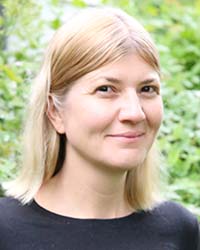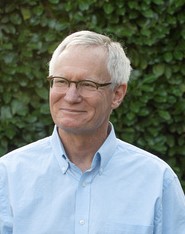Karen Hilberg, whose poems “Grim” and “Now, soft” appear in SRPR 46.1, speaks to the nature of place without memory, and the disjointed nature of poetry as apt for parsing the body in its various places.
I am good at starting over somewhere new; I’ve had to do it more times than I’d like. My last move was from Mexico to Chicago. I didn’t know a single person in the city and I was still grieving the loss of my home in Mexico, but I set about accepting as familiar all the strangeness of the new city: the light pollution, the six-cornered intersections, my too-hot radiator that I couldn’t turn down. My second winter, just as it had begun to feel like home, I lost my short-term memory from a head injury. Suddenly, everything was unfamiliar again.
I would look up from my book to a strange room and not remember how I came to be there. Looking out the window told me nothing of what city I was in. My long-term memories were undamaged, stored in a different part of my brain, and they came to fill in the present moment. In the grocery store I froze at the cash register, unable to remember if I was in Mexico or the US. In the shower my shaky legs and painful head placed me back in Kansas after a car accident at 17, but when I stepped out of the shower, my face in the mirror looked wrong. I was staying in a friend’s spare bedroom, while they cared for me during my recovery. At night, the airplanes flying in low towards O’Hare woke me to confusion—I had no long-term memory of living somewhere you could hear planes. I panicked at the thought of sleeping in a strange place, but I was scared to put my feet to the floor. In the darkness, I felt like my bed was floating in a void. If I could be any place I’ve ever been, it felt like being nowhere at all.
Without memory, even my body—a home I had taken for granted—became a foreign place. My sense of being in my own body felt incidental and as temporary as my presence in a room. The appearance of my own hands would surprise me. I could move my body at my command, but my limbs felt impossibly distant, a wilderness away.
My ability to write had also been affected by the head injury and my doctors told me that if I didn’t work at it, I could lose that ability permanently. The disjointed lines I wrote made better poems than prose. They told a narrative of everything that had ever happened to me, happening to me now all at once, and all the places I have ever been being here right now.
My confusion told a truth: place is not meaningful as the generic location of the events of our lives, but as the intimate memory of the person we were when we were there. There’s no way to access one without the other. When I write about the grass hills of Kansas, the dust in Mexico, or how Lake Michigan changes color every day, I am talking about the girl I was while hiking those hills, how the layer of dust that covered everything in Mexico felt like a tactile reminder of how far I was from home, and how I resented trading my ocean view in Mexico for Lake Michigan’s poor imitation.
I have been in Chicago for over a decade now, the longest I have ever lived anywhere. But I am starting over here a second time. I know I can lose a place without ever leaving it. I can be lost in my own bed. I know I can be a stranger in my own body. And the roots I put down are never stronger than the fragile touch of neuron synapse.

Karen Hilberg studied writing and translation at Knox College. She left a teaching career with Chicago Public Schools after a traumatic brain injury. Her ability to both speak and write were profoundly affected, and her writing and translation came from her years struggling to regain language. Her translations have been published in the Massachusetts Review and her poetry in the Spoon River Poetry Review.
You can order a physical copy of 46.1 on our website, or purchase a 2-year subscription.
And if you want to keep up with us on social media, you can follow us across
Instagram: @srpr_news
Twitter: @srpr_news
Facebook: SRPR (Spoon River Poetry Review)






